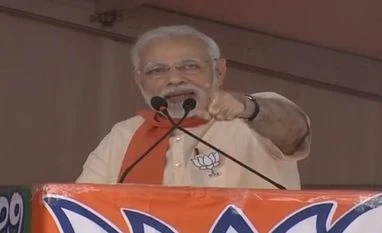On May 4, when Pralhad Joshi, the Dharwad-Hubbali MP, addressed Hubbali's opinion-moulders at the Kanakadasa College, the burden of his speech was that the Karnataka verdict was not "just another" assembly poll but a vote for the Narendra Modi government. Joshi used the conflict-ridden zones of West Bengal, Assam, Chhattisgarh and Jammu and Kashmir as leitmotifs to illustrate the point that since Independence, India has not had a "stronger and more decisive" dispensation than that headed by Prime Minister Modi.
"It's not just an election to vote Jagadish Shettar (who's seeking a fifth term from Hubbali-Dharwad Central). This Karnataka election is a mega Congress versus BJP one. In West Bengal, our workers have been killed by the Mamata Banerjee government. Our government has choked the illegal funds that went to the Hurriyat Conference and the forces that patronise the illegal infiltrators coming into Assam. Modiji's note ban has starved the Maoists of funds," said Joshi, as stray listeners in a packed hall clapped.
The penny dropped as Joshi arrived at the main point after a desultory build-up. “Mamata Banerjee, Congress and Left might attack one another in West Bengal but they are great friends in Delhi. You might have noticed the emerging bonhomie between the Congress and Telugu Desam Party. Stalin and his DMK (Tamil Nadu’s Dravida Munetra Kazhagam) are part of this ‘state mein kusti (wrestling), Dilli mein dosti (camaraderie)’ club. This is a big gang-up against Modiji because this gang opposes whatever decisions he has taken in the national interest. This is a mandate for Modi’s leadership. That’s why it is important to elect the BJP in Karnataka,” Joshi stressed.
Four-and-a-half years into his rule, the fabled Modi appeal and charisma cut both ways. Some of those who heard Joshi were asked for their response. Manjunath, a Lingayat student who stated his family would vote the BJP, said, If thee BJP comes to power in Karnataka, it will be because of Modi’s oratory and dynamism. The state leaders are not up to the mark. They squabble among themselves for the loaves and crumbs of power.”
Maruth HT, a post-graduate student of commerce, was clear that he will vote a candidate and not a party or Modi. A member of the Nayaka tribal community, Maruth was critical of the Centre’s crop insurance scheme and the “shoddy” implementation of the Mahatma Gandhi Rural Employment Guarantee Act by the Modi government as he praised the United Progressive Alliance (UPA) for bringing in the “landmark” legislation and ensuring its benefits reached the targets. “In our villages, the poor and the unlettered don’t know how to claim the insurance for their failed crops although the premiums have been deducted from their bank accounts. As for MNREGA, under the Congress, a basic number of jobs was generated every year. Presently the middlemen have become active and take huge cuts from the money paid to those entitled to the scheme. Even the MNREGA jobs have become scarcer,” said Maruth.
In Karwar, the headquarter of the Uttara Kannada district in the south-west coast that’s wedged between the lush Sahyadri forests and the Arabian sea, the BJP rejected the perception that the coast was communally polarised. Manoj Bhatt, the party’s district president, contended, “Did Yogi Adityanath (the Uttar Pradesh chief minister) utter anything inflammatory? Modiji never speaks of Hindus and Muslims.”
Bhatt claimed there was a “pro-Modi” mood in Uttara Kannada and the BJP harped only on “development” to capitalise on the “sentiment”. “The Siddharamaiah government failed to use the funds that the Centre generously released. The chief minister has marketed the ‘Anna Bhagya’ scheme as his baby. The fact is that the Centre has underwritten the scheme,” he alleged.
Under Siddharamaiah’s massive food security programme for those living below the poverty line, each family is entitled to seven kg of rice, one kg each of wheat and lentil, free of cost, per month as well as cooking oil at a subsidised price of Rs 24 for a litre and iodised salt at Rs two for a packet.
The BJP’s charge was the Centre procured rice at Rs 32.64 for a kg and supplied it to Karnataka for Rs three for a kg, thereby picking up a subsidy of Rs 29.64 per kg. Its workers have propagated the line that the scheme was actually “Modi Bhagya” programme. At a public meeting, Siddharamaiah protested the BJP’s allegation and asked if it was its scheme, why was it not implemented in the BJP-ruled states of UP, Maharashtra and Gujarat?
In an election, where populism and emotions have coalesced into a haphazard whole, the BJP’s promise to write off agricultural loans of Rs one lakh if elected to power has gone down well with the farmers of the drought-affected areas. In Konanakeri village, located in the Haveri district adjoining Hubbali, farmers of every caste, including the Maratha, Kuruba and Lingayat, said they would vote the BJP on the strength of this one assurance alone.
Unlock 30+ premium stories daily hand-picked by our editors, across devices on browser and app.
Pick your 5 favourite companies, get a daily email with all news updates on them.
Full access to our intuitive epaper - clip, save, share articles from any device; newspaper archives from 2006.
Preferential invites to Business Standard events.
Curated newsletters on markets, personal finance, policy & politics, start-ups, technology, and more.
)